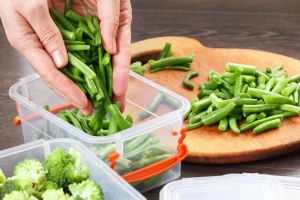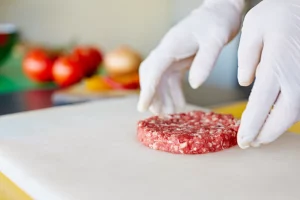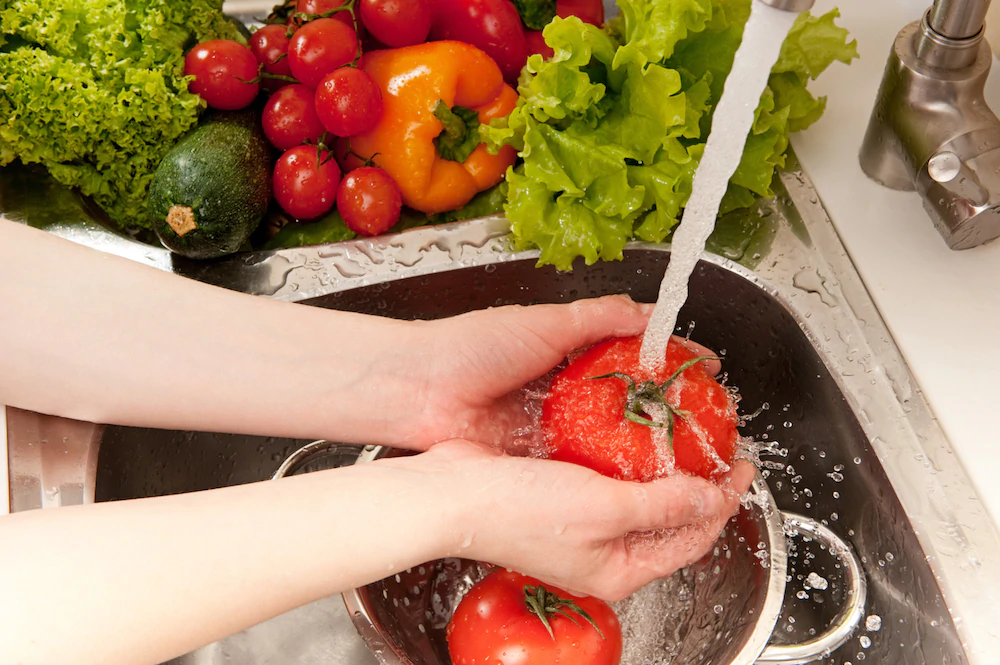Hygiene is a hot topic during this crazy time, so as part of Immunity Fortnight we’re going to talk about food hygiene. While we don’t know much about Coronavirus yet, we believe that keeping your body as healthy as possible is incredibly important. Ensuring you practise good food safety means the chances of what you’re eating making you sick or being contaminated are far less, keeping your body strong and fighting.
Table of Contents
Wash your fresh produce
From the farm to your fridge, your produce has probably been on a bit of a journey before it reaches you. From bugs, pesticides and chemicals, to people at the shop handling it before you purchase it. It can be really hard to know what’s on your fruit and veg by the time it makes it to your kitchen, which is why it’s incredibly important to make sure you wash it properly before cooking it.
Start by washing your hands with soap and water, to prevent any germs transferring from your hands. Don’t use any detergent or soap to wash your produce, but simply wash it under cold, fresh water with your hands, or use a vegetable brush for thick-skinned veggies. For produce with lots of nooks and crannies, you can soak it in clean, cold water for 1 – 2 minutes.
Prep your ingredients properly
So we can wash fruit and veg to help get rid of any contamination, but what about animal products? Always ensuring your meat is cooked all the way through is a great way of practising food safety to get rid of any nasties that might be lingering. For pregnant women, the same advice goes for eggs: always pick a hard-boiled egg over a poached. This is because if the yolk is still runny it could still have potentially-harmful bacteria in it, as the yolk hasn’t been heated enough to remove it.

Always keep raw and cooked foods separate
Raw foods should always be stored on the bottom shelves of the fridge, and cooked foods on the higher shelves. This is because raw foods can contaminate cooked foods if not stored properly, and if the cooked food isn’t reheated enough can then make you sick. The bottom of the fridge tends to also be cooler in temperature which is ideal for raw foods.
How to avoid cross-contamination
Cross-contamination is when bacteria and viruses are transferred from one surface to another, for example between seafood and meat or a dirty knife and a clean chopping board. To practise good food hygiene, separate fresh foods by their food group to avoid cross-contamination. Fresh foods should always be separated by their food group to avoid cross-contamination. Pantry items are generally safe to be stored together as long as they are sealed and in good packaging, which can also prevent them from going stale, meaning you can enjoy them for longer! All the below foods should be stored separately to one another:
- Meat/poultry
- Seafood
- Fruit and veg
- Dairy products
- Breads/cereals
Working in a clean kitchen and regularly cleaning throughout are also key in preventing cross-contamination. Always disinfect your benchtops before and after you cook, and use clean, sanitised chopping boards, knives, forks, plates and other cooking utensils. If you use a knife to chop up raw chicken for example, pop it in the sink and grab a clean one when you move onto vegetables. Lots of homewares stores are selling handy tools like colour-coordinated chopping board sets, so you can always keep the meat/poultry board separate to the fruit and veg.
How to store food correctly
Storing food correctly does more than promote good food hygiene – it can also help reduce food wastage, meaning you get more bang for your buck. Always try and store food in airtight containers, and refrigerate/ freeze ingredients and pre-prepared meals. As a guide, lasagne can be safely kept in the fridge for up to 5-7 days, whereas in the freezer it can be kept for up to 2 months. Marking the date on foods you’re storing is also a great idea, especially if you’re bulk-buying and freezing things, so you know how long food has been there for.

Why you should check the use-by date
Google ‘do food expiration dates matter’ and you’re going to get a mixed range of responses, in particular, a lot claiming use-by dates can be disregarded. WebMD put together a handy list of all the terms you can find on most supermarket foods, so you can make an informed decision on whether the product is safe to consume.
To set the record straight, a use-by date or a best before date should be taken seriously, especially for those at-risk demographics like the elderly, disabled, critically ill and pregnant. With the big virus going around, there’s no room to take chances! Use-by means the product could be at risk of bacterial growth or food spoilage beyond that date, while best before means the quality of the product may not be the best after that date. As well as checking the expiration dates on food you have at home, it’s also handy to check the dates on food you find at the supermarket. This way you can ensure you’re getting the freshest produce, and you have more time to eat everything.
Why it’s important to wash your hands
Finishing on the biggest piece of advice everyone is giving out right now, always make sure to wash your hands. This is not only important when out and about to prevent the spread of germs, but also in your own home. Washing your hands before handling food can help prevent you from contaminating food with the germs and viruses on your hand. After preparing food it can help you from spreading any bacteria that might have been on the food you just touched. Handling raw meat/poultry is especially high-risk, and we’d recommend using gloves or washing your hands for at least 20-30 seconds before and after.
Look after your body Equalutioners, and let’s get through this together!.

